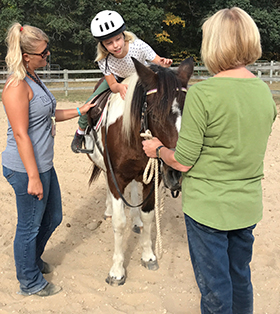Five-year-old Desi Golnek – fitted in a riding helmet – sat astride Scooter, with volunteer David Drombowski holding the horse’s bridle and Thornapple Kellogg paraprofessional Suzanne Thomas on the right.
“Walk on,” said Desi with a happy giggle. Slowly they walked, circling the arena while dodging blue traffic cones.
With each step, Desi worked to stay upright, keep his eyes forward, his hands on the reins, his mind focused. Of course, the coolness factor couldn’t be ignored. “This is cool,” he said.
Desi was at Spirit Farms Riding Center at YMCA Camp Manitou-Lin, in Middleville, delighting in his first therapeutic horseback riding lesson. There, the ponies and horses named Blaze, Cleo, Levi, Chunky Monkey and Hank the Tank, all magnificent gentle beasts, provide a new kind of freedom for students with cognitive impairments such as sensory processing disorders, learning disabilities and physical challenges.
‘When they are out there riding, they know exactly what to do.’ — Heidi Prior, teacher

“Riding a therapy horse is a powerful experience, and an amazing chance to work on their independence,” said Jill Pilecki, a McFall Elementary School cognitively impaired teacher. It’s been 10 years since she established the district’s therapeutic horseback riding partnership with Camp Manitou-Lin, in 2007.
In her second year of teaching, Pilecki lucked into a grant covering the cost of the therapeutic horseback riding. As her little ones moved up in grades and buildings, Pilecki expanded the program to include every student in the cognitive-impaired programs, from kindergarten through high school.
As more students participate the cost has risen. Pilecki depends on grants from local organizations like Thornapple Area Enrichment Foundation, and fundraisers such as the Camp Manitou-Lin Fall Festival on Saturday, Oct. 21, from noon to 4 p.m., with all proceeds helping the special needs programming.
For six weeks in the autumn and spring, each student rides during a weekly 45-minute lesson in groups of five.
Hanging out with the horses is mighty fun, but the students “are working on speech therapy, physical therapy, fine motor skills and communications – that’s a huge piece of this,” Pilecki said. “We’re really building their self-confidence and self-esteem, giving them this control over such a big powerful animal.”

Saddle up, Ride on
During the therapy session, equestrian director Natalie Hamilton called out instructions: “Keep those toes up to the sky. Let’s everyone double-check — are we sitting up nice and tall like big trees? Toes up to sky. Heels down to the ground. Where are we looking? Straight ahead, not at the ground.”
Lee Elementary fourth-grade student Gwen Triick finds happiness riding Static, with the help of Maria Porth, a retired TK school physical therapist who now volunteers with the equine therapy program. She lovingly pats the horse, strokes its mane, speaks in a giggly coo.
“He’s a cool horse, a good boy,” said Gwen, who attended the YMCA’s days camps with her older siblings over the summer.
For the high schoolers who’ve ridden since the program’s inception, this on-the-ground therapy with horses in the barn, arena and pasture gives them a real connection to Spirit Farms. Garret Schleh, a junior, started riding in 2007. He now returns for his third year volunteering in the evenings.

“I like working with the kids and the horses and the other volunteers,” said Garret, who also has taken lessons there. “I enjoy being a side-walker or leader when helping with a riding lesson. This makes me feel good that I am helping someone out.”
As it turns out, they really like Garret over here.
“Garret’s happiest when he’s here and we love his dedication,” said Kat Witt, who coordinates the special-needs programming at Camp Manitou-Lin. “We’re waiting for him to graduate so we can hire him.
“The benefits of therapeutic riding – especially being outside like this on a beautiful day — are measured by the laughter, the calm, the elation of riding, and all of that is part of them now,” Witt added.
A Joyful Connection
Heidi Prior, a teacher to cognitively impaired students at the high school, is sold on the therapeutic powers of horseback riding.
“It’s amazing. They came back after the first ride of the season and they were giddy, just giddy: ‘I’m riding independently,'” Prior said. “You can see the joy on their faces, the connection that they feel for the animals.

“For some of them, life has felt like a battle,” she added. “But this is thrilling – it gives me goose bumps to see how far that they’ve come, how they engage in their world. When they are out there riding, they know exactly what to do.”
Pilecki’s determination propels the 10-year partnership with Camp Manitou-Lin’s therapeutic equine program and its many volunteers. They include Pilecki’s mother, Teresa, who shows up every Monday and Wednesday during the six-week run.
“This makes all the difference in the world to them,” Pilecki said. “But we need three separate groups to make it happen: the riding center at Camp Manitou-Lin, the wonderful volunteers and TK’s commitment to the kids. It’s working, and I feel lucky about that.”
CONNECT
Camp Manitou-Lin Fall Festival 2017















